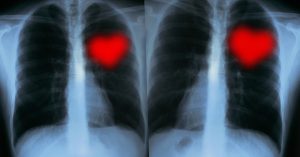How Dangerous is Atrial Fibrillation?
Even if a stroke is avoided, atrial fibrillation can weaken the heart to the point that it is unable to pump enough blood throughout the body. This is known as heart failure, a lifelong condition that can cause severe health problems and lead to death. Due to the potentially lifelong implications of atrial fibrillation, it’s imperative that anyone who is experiencing an irregular heartbeat seek diagnosis and treatment from a qualified cardiologist in Tampa, FL.
• Advanced Age
• Heart Disease
• High Blood Pressure
• Kidney or Lung Disease
• Thyroid Issues
• Sleep Apnea
• Alcoholism
• Obesity
• Diabetes
• Family History
At Ascent Cardiology Group, we specialize in interventional cardiology, an innovative branch of cardiology that is focused on non-surgical methods to diagnose and treat heart conditions. Accordingly, our treatment plans are personalized and depend entirely on patient needs. When looking for the treatment plan that’s right for you, place your trust in Dr. Sachin Diwadkar and the team of professionals at Ascent Cardiology Group.
The content, views, and opinions communicated on this website do not represent the views of Ascent Cardiology Group. Reliance on any information provided by this website is solely at your own risk. Although this website contains links to other medical websites, this is strictly for informational purposes. Ascent Cardiology Group is not responsible nor do they approve of the content featured on any third party linked websites referenced on this website.

Stress and Heart Disease: What You Can Do to Improve Your Heart Health
Working long hours, filling up free time, and taking on additional responsibilities is a way of life for Type A

What is Nuclear Cardiology?
Nuclear cardiology is a subspeciality of general cardiology that involves the use of radioactive substances and advanced medical imaging modalities

Coronary Heart Disease: What Is It and How Is It Treated?
In addition to being the most common type of heart disease, coronary heart disease is the deadliest. In fact, it’s
Diseases of the Mitral Valve
Those suffering from a condition involving the mitral valve can get progressively worse over time if left untreated. Mitral valve diseases, such as mitral valve regurgitation and mitral valve stenosis, can be debilitating on their own, but they also open the door for other conditions, such as heart dilation and atrial fibrillation. If you are experiencing symptoms such as shortness of breath, chest pain, dizziness, fatigue, swollen ankles or legs, persistent coughing, or heart palpitations, consult a cardiologist in Tampa, FL, from Ascent Cardiology Group to see if you are suffering from one of the diseases of the mitral valve.
Approximately two percent of the population suffers from mitral valve prolapse. Generally, this disease is passed down through genetics, but it can also be caused by health problems, like connective tissue diseases. Detecting mitral valve prolapse without the assistance of a cardiologist in Tampa can be difficult. Your cardiologist can listen to your heartbeat with a stethoscope to detect a murmur that may be indicative of mitral valve prolapse. Other symptoms include heart palpitations, chest pain, and fatigue.
The content, views, and opinions communicated on this website do not represent the views of Ascent Cardiology Group. Reliance on any information provided by this website is solely at your own risk. Although this website contains links to other medical websites, this is strictly for informational purposes. Ascent Cardiology Group is not responsible nor do they approve of the content featured on any third party linked websites referenced on this website.

Stress and Heart Disease: What You Can Do to Improve Your Heart Health
Working long hours, filling up free time, and taking on additional responsibilities is a way of life for Type A

What is Nuclear Cardiology?
Nuclear cardiology is a subspeciality of general cardiology that involves the use of radioactive substances and advanced medical imaging modalities

Coronary Heart Disease: What Is It and How Is It Treated?
In addition to being the most common type of heart disease, coronary heart disease is the deadliest. In fact, it’s
The Differences Between Invasive and Interventional Cardiology
In this brief article, we will be discussing the key differences between invasive cardiology and interventional cardiology — two approaches that can have drastically different outcomes for patients. Consult with the best interventional cardiologist in Tampa, Dr. Sachin V. Diwadkar, FACC, FASE, of Ascent Cardiology Group, for any questions regarding your heart health.
The problem with invasive cardiology is that femoral access is gained through the groin area. Complications associated with femoral access through the groin include increased discomfort and long recovery times. While rare, pseudoaneurysm, acute limb ischemia, and retroperitoneal bleeding can also occur.
Upon completing his residency and fellowship in Cardiovascular Diseases, Dr. Diwadkar completed an additional fellowship in Interventional Cardiology at Tampa General Hospital and University of South Florida-affiliated institutes. When looking for interventional cardiology in Tampa, turn to Dr. Diwadkar and the team of cardiologists at Ascent Cardiology Group.
The content, views, and opinions communicated on this website do not represent the views of Ascent Cardiology Group. Reliance on any information provided by this website is solely at your own risk. Although this website contains links to other medical websites, this is strictly for informational purposes. Ascent Cardiology Group is not responsible nor do they approve of the content featured on any third party linked websites referenced on this website.

Stress and Heart Disease: What You Can Do to Improve Your Heart Health
Working long hours, filling up free time, and taking on additional responsibilities is a way of life for Type A

What is Nuclear Cardiology?
Nuclear cardiology is a subspeciality of general cardiology that involves the use of radioactive substances and advanced medical imaging modalities

Coronary Heart Disease: What Is It and How Is It Treated?
In addition to being the most common type of heart disease, coronary heart disease is the deadliest. In fact, it’s
What is Athlete’s Heart?
• Structural Changes: 10-25 percent increase in left ventricular wall thickness; 15 percent increase in bi-atrial dilatation in the left and right ventricle.
• Electrical Changes: sinus bradycardia, sinus arrhythmia, first degree atrioventricular block, voltage left ventricular hypertrophy and right ventricular hypertrophy, incomplete right bundle branch block, and T-wave inversion in all four ventricles.
• Functional Changes: increases in diastolic filling time; increase in stroke volume.
• Peripheral Changes: increase in skeletal muscle fibres, increase in capillary conductance, increase in oxidative capacity, increase in mitochondrial enzymes, and increase in oxygen consumption.
Athlete’s heart is not technically considered a medical condition, but it should be monitored closely to ensure that medical conditions with similar symptoms and signs aren’t present. If you experience chest pain or your heart measurements fall in a certain range between normal and abnormal, consult a cardiologist in Tampa from Ascent Cardiology Group for a stress-free consultation to ensure that your heart health is in peak shape.
The content, views, and opinions communicated on this website do not represent the views of Ascent Cardiology Group. Reliance on any information provided by this website is solely at your own risk. Although this website contains links to other medical websites, this is strictly for informational purposes. Ascent Cardiology Group is not responsible nor do they approve of the content featured on any third party linked websites referenced on this website.

Stress and Heart Disease: What You Can Do to Improve Your Heart Health
Working long hours, filling up free time, and taking on additional responsibilities is a way of life for Type A

What is Nuclear Cardiology?
Nuclear cardiology is a subspeciality of general cardiology that involves the use of radioactive substances and advanced medical imaging modalities

Coronary Heart Disease: What Is It and How Is It Treated?
In addition to being the most common type of heart disease, coronary heart disease is the deadliest. In fact, it’s
3 Cutting-Edge Cardiology Treatments You Should Know About
Once a heart ailment takes root, you’ll naturally want to act fast so you can resume your normal life. The first step is to find a cardiologist in Tampa who has been serving the community for years and possesses the certifications to perform cutting-edge cardiology treatments that eliminate the pain and hassle of outdated methods.
If you want top-tier medical care that takes the discomfort out of an inherently uncomfortable situation, consult Dr. Sachin V. Diwadkar, FACC, FASE, of Ascent Cardiology. Well-versed in advanced medical services ranging from general cardiology to echocardiography to nuclear cardiology and interventional cardiology, Dr. Diwadkar is board certified in treatments to get patients on the road to recovery as quickly and painlessly as possible.
As a heart patient, you want treatment options that allow you to feel your best without first making you feel your worst. Board certified cardiologists offer more options for treating your heart ailment and can greatly reduce the discomfort of outdated treatments.
The content, views, and opinions communicated on this website do not represent the views of Ascent Cardiology Group. Reliance on any information provided by this website is solely at your own risk. Although this website contains links to other medical websites, this is strictly for informational purposes. Ascent Cardiology Group is not responsible nor do they approve of the content featured on any third party linked websites referenced on this website.

Stress and Heart Disease: What You Can Do to Improve Your Heart Health
Working long hours, filling up free time, and taking on additional responsibilities is a way of life for Type A

What is Nuclear Cardiology?
Nuclear cardiology is a subspeciality of general cardiology that involves the use of radioactive substances and advanced medical imaging modalities

Coronary Heart Disease: What Is It and How Is It Treated?
In addition to being the most common type of heart disease, coronary heart disease is the deadliest. In fact, it’s
The Benefits of Interventional Cardiology
In this short article, we will explain why interventional cardiology is a preferred treatment option for many heart ailments. If you are looking for the best heart doctor in Tampa Bay, consult a cardiologist, like Dr. Sachin V. Diwadkar, FACC, FASE, of Ascent Cardiology, who can offer a wide range of services from time-tested general cardiology treatments to cutting-edge interventional cardiology procedures.
Cardiologists who are certified to perform interventional cardiology must undergo one to two years of specialized medical training after completing their fellowship in general cardiology. The commitment to mastering interventional cardiology helps to ensure patient success, and should not be overlooked when you are seeking out the best heart doctor in Tampa.
The content, views, and opinions communicated on this website do not represent the views of Ascent Cardiology Group. Reliance on any information provided by this website is solely at your own risk. Although this website contains links to other medical websites, this is strictly for informational purposes. Ascent Cardiology Group is not responsible nor do they approve of the content featured on any third party linked websites referenced on this website.

Stress and Heart Disease: What You Can Do to Improve Your Heart Health
Working long hours, filling up free time, and taking on additional responsibilities is a way of life for Type A

What is Nuclear Cardiology?
Nuclear cardiology is a subspeciality of general cardiology that involves the use of radioactive substances and advanced medical imaging modalities

Coronary Heart Disease: What Is It and How Is It Treated?
In addition to being the most common type of heart disease, coronary heart disease is the deadliest. In fact, it’s
5 Lesser Known Heart Conditions
Considering the fact that about 735,000 Americans suffer from a heart attack each year, it’s important to keep a close eye on your heart health. Heart disease isn’t necessarily a rarity, and a person can become a part of these shocking statistics quite easily if they have high blood pressure, high cholesterol, or diabetes. Furthermore, people who smoke, are overweight or obese, have a poor diet, are physically inactive, or consume alcohol excessively have a higher risk of heart disease according to the Centers for Disease Control and Prevention (CDC).
If you suffer from any of these conditions or take part in activities that have been linked to heart disease, consult the best cardiologist in Tampa, Dr. Sachin V. Diwadkar, FACC, FASE, of Ascent Cardiology. In addition to CHD, heart disease can manifest in a variety of lesser known conditions, including heart failure, aortic aneurysms, arrhythmia, valvular heart disease, and heart infections.
• Aortic valve regurgitation
• Aortic valve stenosis
• Endocarditis
• Mitral valve regurgitation
• Mitral valve stenosis
• Mitral valve prolapse
The content, views, and opinions communicated on this website do not represent the views of Ascent Cardiology Group. Reliance on any information provided by this website is solely at your own risk. Although this website contains links to other medical websites, this is strictly for informational purposes. Ascent Cardiology Group is not responsible nor do they approve of the content featured on any third party linked websites referenced on this website.

Stress and Heart Disease: What You Can Do to Improve Your Heart Health
Working long hours, filling up free time, and taking on additional responsibilities is a way of life for Type A

What is Nuclear Cardiology?
Nuclear cardiology is a subspeciality of general cardiology that involves the use of radioactive substances and advanced medical imaging modalities

Coronary Heart Disease: What Is It and How Is It Treated?
In addition to being the most common type of heart disease, coronary heart disease is the deadliest. In fact, it’s
Identifying Women’s Heart Attack Symptoms
If you think you are having a heart attack, it’s imperative that you call 911 immediately. In the case of a heart attack, be proactive and don’t hesitate to get the assistance you need. Every minute counts during a heart attack, and preserving these minutes could, in turn, save years of your life. Women’s symptoms are often underreported, so it’s imperative that you familiarize yourself with these symptoms to effectively identify a potential heart attack.
If you’ve been experiencing discomfort in your chest, shortness of breath, or a general feeling of uneasiness, consult a cardiologist in Tampa, FL, from Ascent Cardiology. Dr. Sachin V. Diwadkar, FACC, FASE, of Ascent Cardiology utilizes the latest non-invasive cardiovascular procedures to help improve patients’ heart health while minimizing discomfort and side effects.
• Feelings of fullness, pressure, or a squeezing sensation in the center of your chest lasting more than a few minutes or occurring irregularly over a period of time.
• Persistent aches or discomfort in one arm or both arms, as well as the back, neck, jaw, or stomach.
• Sudden shortness of breath accompanied (or unaccompanied) by chest discomfort. Cold sweat, nausea, or lightheadedness.
Remember, women are just as likely to experience the most common heart attack symptom — chest pain — as men; however, they are generally more likely to experience the symptoms listed above, too.
The best way to thwart a heart attack from happening in the first place is to find out if you’re at risk by consulting a cardiologist in Tampa. Your cardiologist can give you accurate insight about the state of your cardiovascular health and provide suggestions to help you prevent a heart attack from happening. Some common suggestions include quitting smoking and partaking in a simple, daily exercise routine. Healthy eating habits also go a long way to preserve your heart health.
The content, views, and opinions communicated on this website do not represent the views of Ascent Cardiology Group. Reliance on any information provided by this website is solely at your own risk. Although this website contains links to other medical websites, this is strictly for informational purposes. Ascent Cardiology Group is not responsible nor do they approve of the content featured on any third party linked websites referenced on this website.

Stress and Heart Disease: What You Can Do to Improve Your Heart Health
Working long hours, filling up free time, and taking on additional responsibilities is a way of life for Type A

What is Nuclear Cardiology?
Nuclear cardiology is a subspeciality of general cardiology that involves the use of radioactive substances and advanced medical imaging modalities

Coronary Heart Disease: What Is It and How Is It Treated?
In addition to being the most common type of heart disease, coronary heart disease is the deadliest. In fact, it’s